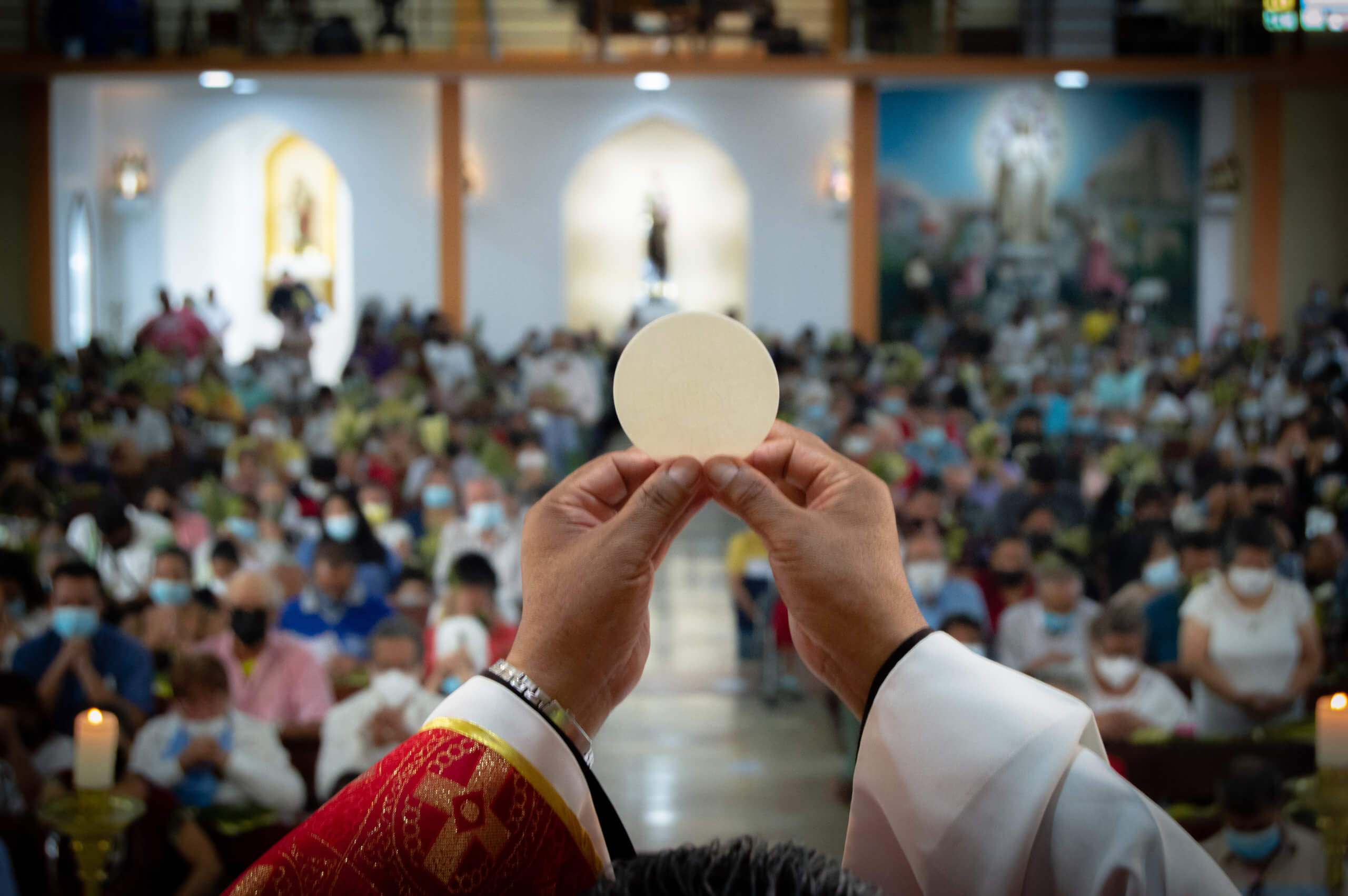Editor’s note: First Friday reminder to join the Crusade of Eucharistic Reparation.
Belief in the Eucharist: Part I
Praying for Eucharistic Revival
We attended a Novus Ordo Mass this weekend. To our surprise the presiding priest (let’s call him Fr. John) spent the first 10 minutes explaining a “new” practice being incorporated into their Mass: the use of the paten. After explaining the purpose of the paten, Fr. John said, “Last week, I saw five instances of people waking off with particles left on their hands. If you choose to receive on the hand, you must consume Christ right there on the spot. There will be someone [the paten bearer] watching for mistakes so no one walks away wiping Jesus on their pants. You must make sure to consume what is left behind. Consider your hands a kind of paten. Make sure there is no writing on it or anything like that.”
He continued: “For almost 2,000 years, Catholics received on the tongue. It’s a beautiful practice, but there are practical reasons for it too.”
It is no coincidence that this parish is accepting an “innovation,” such as the paten, at this time. Most Catholics have heard the statistics on belief in the Eucharist. Only 49% of Catholics believe in the Real Presence, according to a 2019 EWTN/RealClear Opinion Research poll. A Pew poll the same year found that only 31% believe that the bread and wine become the real Body and Blood of Christ.
These numbers have dropped so low, the USCCB initiated what it calls the “Eucharistic Revival” last June. It trained and sent out 60 “Eucharistic preachers” who will speak at various events nationwide over the next 3 years. Fr. John started making changes to his parish several years ago, but his methods are the same as the USCCB: educate the clergy and the faithful and hope they will change.
Fr. John’s Novus Ordo Msss was different from the last time we attended 6 months ago. It is adopting “new” [re: traditional] practices at a rapid pace. There were bells at the consecration, and the incense rose beautifully in front of a rose window, catching shades of bright blue and green. Fr. John’s homily was on confession and John 6:6, and after dismissal, he led us in a Hail Mary and the Prayer to St. Michael.
During the Mass we attended, Fr. John blessed the patens and explained that if even one crumb falls on a paten it has come in contact with God, therefore it must be consecrated to God. He also blessed the Eucharistic ministers and altar servers, some of them wearing white gloves because, in direct tension with the statement on consecration above, Holy Communion was administered by laypeople.
Fr. John has a long road ahead. His colleague, the head pastor, receives derogatory emails from parishioners about even minor changes, like using more candles on the altar. At the Mass we attended, as soon as the final song began, hundreds of parishioners left the church, and an uproarious chatter filled the nave. Half a dozen people were left kneeling in thanksgiving as applause for the band rang out. Where were the other nine whom Jesus had also cured?
After Mass, I said to Fr. John, “I thought only priests’ hands were consecrated and could come in contact with the Eucharist.” He said there is no rite for consecrating the hands of laypeople and admitted privately that his “hope is to return administration of the Eucharist to acolytes, and eventually back to the priests – get the priests to do their job.”
Many traditional Catholics scoff at the idea that the Novus Ordo can be improved upon, but we should be fair and say that Fr. John and the USCCB are fighting an admirable battle. The statistics illustrate a lack of religious education among Catholics, for it is self-proclaimed Catholics who also reported no belief in the Eucharist. They do not accept, or were never taught, that to lack belief in the sacrificial mystery re-presented at Mass is to no longer be Catholic.
We should pray that the USCCB’s efforts to educate fallen Catholics will bring them back to the Faith and more deeply into Body of Christ. Changes to the Novus Ordo Mass, increased adoration, conferences, and constant preaching on the Eucharist just might enlighten their minds or awaken their consciences. Despite the apparent division between traditional and Novus Ordo Catholics, it is our duty to pray earnestly that they may develop a deep faith in Our Lord’s presence in the Eucharist, whether that be at their Novus Ordo parish or at our Latin Mass.
Photo via Cathopic.


